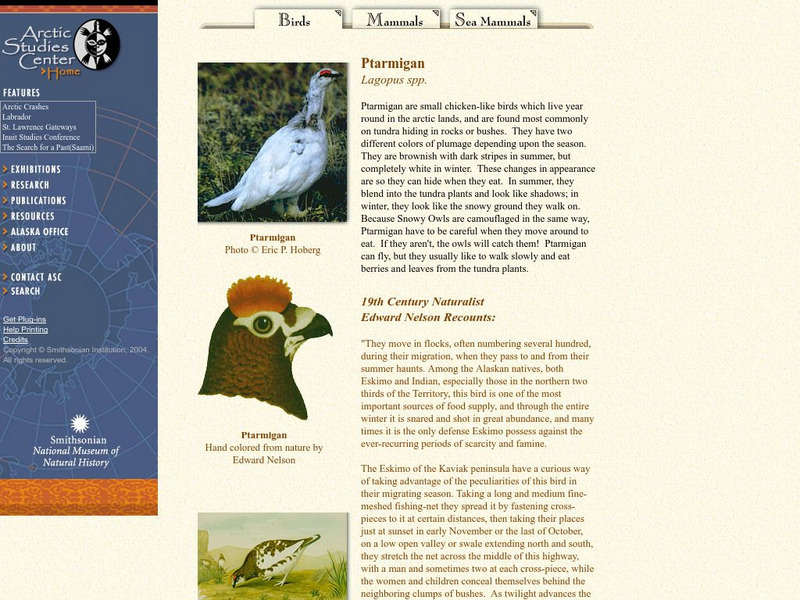TED Talks
Ted: Ted Ed: The Hidden Worlds Within Natural History Museums
When you think of natural history museums, you might picture exhibits filled with ancient lifeless things, like dinosaurs or meteorites. But behind that educational exterior, there are hidden laboratories where scientific breakthroughs...
San Diego Natural History Museum
San Diego Natural History Museum: Dinosaur Dig
The San Diego Natural History Museum provides dinosaur lovers with plenty of information and fun facts with links to Finding Fossils and Dinosaur Bytes.
Natural History Museum
Natural History Museum: Lichens
This expansive guide to lichens offerings many helpful resources. After a lengthy introduction complete with picture examples, this site offers a lichen guide to lichens on twigs.
Smithsonian Institution
National Museum of Natural History: Invertebrate Zoology Collections Search
A searchable database of the collections of invertebrates at the National Museum of Natural History. You can search by keyword, or in a more scientific way, such as by phylum or expedition.
Natural History Museum
Natural History Museum: Meteorites
As an online exhibit on meteorites, this site provides information on both collecting and identifying meteorites. Topics covered include falls and finds, hot desert meteorites, Antarctic meteorites, and more.
American Museum of Natural History
American Museum of Natural History: The Ancient City of Petra
Explore the story and history of the ancient city of Petra.
San Diego Natural History Museum
San Diego Natural History Museum: Fossil Field Guide: Sabertooth Cat
Brief look at the fossil evidence that reveals the life and ecological interactions of the extinct saber-toothed cat.
San Diego Natural History Museum
San Diego Natural History Museum: Mineral Matters
Learn more about the properties of minerals.
Smithsonian Institution
National Museum of Natural History: Paleobiology: Geologic Time: The Oligocene
Travel through Earth's history to learn about the Oligocene time period, which is characterized by the appearance of most of the living families of mammals.
American Museum of Natural History
American Museum of Natural History: Living Large
This engaging game about dinosaurs allows students to analyze and interpret fossil data, as well as engage in argument from evidence. The game helps students to understand that fossils provide evidence about the types of organisms that...
Smithsonian Institution
National Museum of Natural History: Arctic Studies Center: Polar Bear
The Smithsonian National Museum of Natural History, in a section titled "North American Mammals," offers a general overview of the polar bear. Additional content includes detailed drawings, photographs, and a map showing the polar bear's...
Smithsonian Institution
National Museum of Natural History: Northwest Coast American Indian Bibliography
The National Museum of Natural History of the Smithsonian presents an extensive annotated bibliography of works on Native Americans for grades K-12.
American Museum of Natural History
American Museum of Natural History: Dinosaurs: Bambiraptor and Birds
A 14-year-old boy found the fossils of a brand new species of dinosaur--the Bambiraptor. Find out the fun facts about what scientists have discovered about the Bambiraptor and how closely it was related to birds with this resource.
Other
Arizona Museum of Natural History: The Hohokam
This informative site from the Arizona Museum of Natural History gives a good look at the Hohokam and their culture. Find a map that shows where these early Southwest people traded, see examples of their pottery and jewelry, and read...
Natural History Museum
Natural History Museum: Our Place in the Universe
Part of a larger online exhibit on the moon and space, this site deals with one's place in the universe. The topics covered include the sun and solar system, the galaxy, and the universe.
Smithsonian Institution
National Museum of Natural History: The Splendor of Diamonds
A collection of seven rare diamond types, among the most valuable in the world. All but one is a unique color, and each has a special title. Read a short descriptive history of each diamond.
English Zone
English Zone: Los Angeles Area Gets a New Spider
This is an article from The Natural History Museum of Los Angeles about a new tropical "Brown Widow" spider found in Los Angeles; it is followed by 15 self-grading questions.
American Museum of Natural History
American Museum of Natural History: O Logy: Stuff to Do: Create a Coral Reef
Detailed instructions, with photographs for every step, for how to build a coral reef diorama.
American Museum of Natural History
American Museum of Natural History: Sharks and Rays: Myth and Reality
Learn about the reproductive system of the dogfish shark through a video gallery. Also read about the myth that sharks must constantly swim or they will die. PDF transcripts are available for each video.
American Museum of Natural History
American Museum of Natural History: Find a Vent
Learn all about hydrothermal vents deep in the ocean and how scientists locate them. Then take a virtual expedition to the Juan de Fuca Ridge in the north Pacific and see if you can discover a new deep sea vent.
Smithsonian Institution
National Museum of Natural History: Ptarmigan
This Smithsonian website has a brief, but thorough, article on the Ptarmigan. It also includes pictures and an extensive quote from 19th Century naturalist Edward Nelson.
American Museum of Natural History
American Museum of Natural History: What Is Water?
This comprehensive article provides information about the physical properties of water, the importance of water as an Earth material, the processes and cycles that water undergoes on Earth, its importance to life on Earth, and why we...
University of Florida
Florida Museum of Natural History: Physical Science
This guide focuses on four physical science topics that fascinate children and scientists alike. They are motion, magnets, sound, and light. With your guidance and support, these topics provide children with many opportunities to explore...
San Diego Natural History Museum
San Diego Natural History Museum: Fossil Field Guide: Crassatellid Clam
A look at what fossil evidence reveals about the life and ecological interactions of this extinct species of a clam.

















